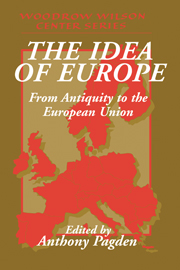Book contents
- Frontmatter
- Contents
- Acknowledgments
- Introduction
- 1 Europe: Conceptualizing a Continent
- 2 Some Europes in Their History
- 3 “Europe” in the Middle Ages
- 4 The Republican Mirror: The Dutch Idea of Europe
- 5 The Napoleonic Empire and the Europe of Nations
- 6 Homo Politicus and Homo Oeconomicus: The European Citizen According to Max Weber
- 7 The European Self: Rethinking an Attitude
- 8 European Nationalism and European Union
- 9 From the Ironies of Identity to the Identities of Irony
- 10 Muslims and European Identity: Can Europe Represent Islam?
- 11 The Long Road to Unity: The Contribution of Law to the Process of European Integration since 1945
- 12 The Euro, Economic Federalism, and the Question of National Sovereignty
- 13 Identity Politics and European Integration: The Case of Germany
- 14 Nationalisms in Spain: The Organization of Convivencia
- 15 The Kantian Idea of Europe: Critical and Cosmopolitan Perspectives
- Contributors
- Index
- Cambridge Cultural Social Studies
7 - The European Self: Rethinking an Attitude
Published online by Cambridge University Press: 14 July 2009
- Frontmatter
- Contents
- Acknowledgments
- Introduction
- 1 Europe: Conceptualizing a Continent
- 2 Some Europes in Their History
- 3 “Europe” in the Middle Ages
- 4 The Republican Mirror: The Dutch Idea of Europe
- 5 The Napoleonic Empire and the Europe of Nations
- 6 Homo Politicus and Homo Oeconomicus: The European Citizen According to Max Weber
- 7 The European Self: Rethinking an Attitude
- 8 European Nationalism and European Union
- 9 From the Ironies of Identity to the Identities of Irony
- 10 Muslims and European Identity: Can Europe Represent Islam?
- 11 The Long Road to Unity: The Contribution of Law to the Process of European Integration since 1945
- 12 The Euro, Economic Federalism, and the Question of National Sovereignty
- 13 Identity Politics and European Integration: The Case of Germany
- 14 Nationalisms in Spain: The Organization of Convivencia
- 15 The Kantian Idea of Europe: Critical and Cosmopolitan Perspectives
- Contributors
- Index
- Cambridge Cultural Social Studies
Summary
Individualism has long been a stereotype of European identity. In such magisterial works as C. B. Macpherson's The Rise of Possessive Individualism and, in a contrastive mode, Louis Dumont's Homo Hierarchicus, the conventional self-view of Europeans as autonomous selves possessing discrete property and distinctive properties appears as a fundamental assumption, the bedrock on which virtually all explorations of European society and culture comfortably rest. In the nineteenth century, notably in the writings of the conservative politician-pamphleteer François Guizot, that self was expanded to fill the image, not only of a nation (France), but of a far larger entity that was at once continent, idea, and culture—namely, Europe itself.
That concept was powerfully exported through colonial and other extensions of the imperial European presence. An outstanding example is the celebration of “rugged individualism” in the United States, where today that notion of tough self-underscores a range of ideologies from official voluntaristic doctrines to the rantings of the far right. In Québec, as Richard Handler has shown, it underwrites the logic and appeal of Francophone nationalism. In Australia its realization as a form of egalitarian “mateship” is perhaps blunter in its gendered and racial exclusivity, but for that reason exemplifies and illustrates the same basic pattern. Thus exported, individualism has acquired a truly global significance: as the “common sense” of universalizing models of responsibility and rationality, it precludes alternative visions of the relationship between self and society.
- Type
- Chapter
- Information
- The Idea of EuropeFrom Antiquity to the European Union, pp. 139 - 170Publisher: Cambridge University PressPrint publication year: 2002
- 21
- Cited by

